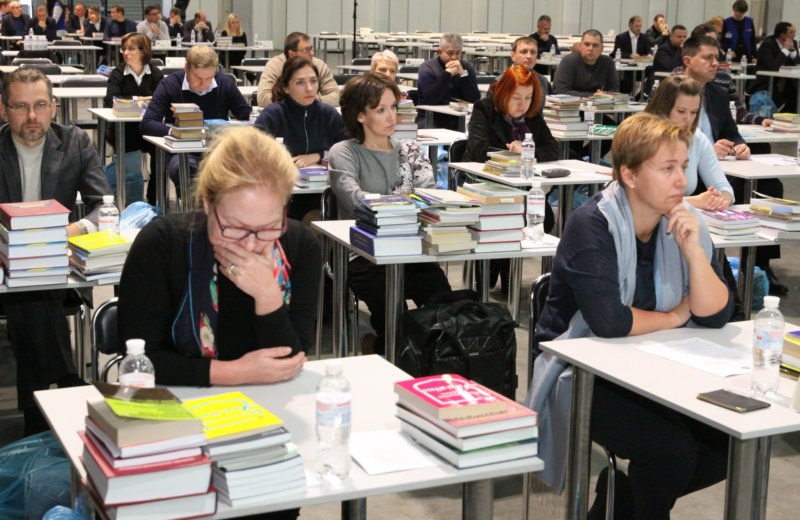The High Qualification Commission of Judges and the Public Council of International Experts or PCIE on Jan. 28 held a final briefing on their joint work to veto candidates for the High Anti-Corruption Court.
They, as well as anti-corruption activists, praised the foreign expert panel’s role in banning 42 out of 113 candidates for the court from the competition due to doubts about their integrity and professional ethics.
However, concerns remain about the integrity and professionalism of some candidates who have not been vetoed, the transparency of the selection process, and possible manipulations and falsifications.
Transparency?
“What we have done is simply extraordinary,” Anthony Hooper, chairman of the PCIE, said at the Jan. 28 briefing. “Ukraine is the first country in the world to my knowledge to invite international experts to the appointment of judges. Ukraine should be hugely proud of what that legislation enabled us to do.”
Seven candidates for the anti-corruption court whose integrity and professionalism were considered by the panel were not vetoed by the PCIE and were allowed to compete further.
However, the transparency of the process has been questioned, as the PCIE and the High Qualification Commission have not specified the reasons why these seven candidates were not vetoed. The PCIE declined to comment on the issue, and the commission did not respond to a request for comment.
Additionally, the PCIE and the High Qualification Commission have not published the number of their members who voted for or against specific candidates.
Landmark case
One of the seven candidates who were not vetoed – Serhiy Bodnar, a scholar at the Chernivtsi National University – admitted that he had an oral agreement to represent the interests of President Petro Poroshenko’s Bloc in court in 2017.
The law on the High Anti-Corruption Court explicitly states that a candidate who has worked for political parties or had any other contractual relations with parties over the past five years cannot be appointed as a judge of the court. Therefore there are concerns that Bodnar’s potential appointment may be recognized as illegal and compromise the process of the court’s selection.
Bodnar argued that he had represented a party branch, not a party, and that the ban does not apply to this type of work.
Lawyers Roman Kuybida and Vitaly Tytych dismissed Bodnar’s explanations as incorrect, telling the Kyiv Post that the legal ban applies to Bodnar, and he cannot be appointed as a judge of the anti-corruption court.
Kuybida said that the legitimate aim of the law on the anti-corruption court is to prevent political influence, and therefore the wording of the law applies to any kind of contract with political parties.
There are also concerns about potential political influence on Bodnar because he worked as the head of an election commission representing the Poroshenko Bloc in 2014, and his wife works at the Poroshenko Bloc as well. In 2012 he was the head of an election commission representing the Ukraina Vpered party of Natalia Korolevska, an ally of the then president, Viktor Yanukovych.
Bodnar argued that he was not biased in favor of any political groups.
“There were some difficult questions of law,” Hooper told the Kyiv Post on Jan. 28. “As to whether representing someone under a power of attorney in court is the kind of contractual relationship that is referred to in the legislation, you make it out to be a very simple and straightforward question, and you may be wrong.”
However, members of the PCIE have previously contradicted this statement.
“The power of attorney that this candidate held to support his representation of the political party refers to an oral agreement which we interpret to mean a contractual relationship,” Ted Zarzeczny, a member of the PCIE, said at a joint meeting of the PCIE and the High Qualification Commission on Jan. 22.
Manipulations
Another accusation is that, while assessing candidates’ integrity, the PCIE has not fully assessed their professional knowledge and skills, although the foreign panel argues that it has assessed them.
Specifically, the foreign panel has not assessed candidates’ practical assignments and has not interviewed half of the candidates to establish their level of professional knowledge and skills.
One more concern is speculation that the High Qualification Commission may now arbitrarily manipulate the ranking of the remaining candidates for the anti-corruption court to promote those it favors. The commission’s methodology for selecting judges has been lambasted as arbitrary by the Public Integrity Council, the judiciary’s civil society watchdog, which says it potentially gives the commission very broad scope for manipulating the results.
There are also accusations that the selection of anti-corruption judges has been rigged, which is denied by the High Qualification Commission.
In December, the High Qualification Commission of Judges also prompted criticism by allowing some candidates who did not get the minimum score for the practical exams for the anti-corruption court and the Supreme Court to pass on to the next stage. The commission argued this complied with its regulations, but its critics said this could be a means of promoting candidates favored by the commission and political loyalists.
The High Qualification Commission has been accused of manipulating the Nov. 12 legal knowledge tests for the High Anti-Corruption Court and the Supreme Court.
Some of the test questions had more than one correct answer, according to ex-Public Integrity Council member Vitaly Tytych, High Qualification Commission member Andriy Kozlov and Judge Mykhailo Slobodin. The commission had the opportunity to promote some candidates by telling them which answers were correct, according to Tytych, who participated in the competition for the Supreme Court but did not pass the tests.
The commission then refused to give him his test results, which he says proves they were falsified.



